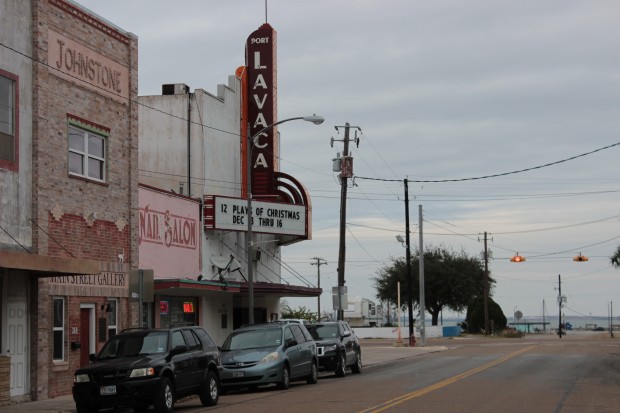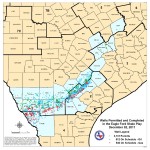As Oil and Gas Surge, a Town on the Texas Coast Hopes for Transformation

Dave Fehling/StateImpact Texas
The small community of Port Lavaca got a boost a few decades ago with the opening of a plastics plant.
Oil and gas have always fueled dreams in Texas. Here’s one more.
“It feels like Port Lavaca is right on the verge of something really big happening,” says Bob Turner, the city manager for this coastal community of 12,000 people.

Dave Fehling/StateImpact
New pipeline under construction outside Formosa Plastics plant in Point Comfort
With its commercial fishing fading, Port Lavaca got a boost a couple decades ago from a big expansion of the Formosa plastics plant in nearby Point Comfort. Now the plant is expanding again, saying it will spend some $1.7 billion on new facilities. The move is linked to the cheap natural gas liquids used to make plastic. With so much natural gas (and oil) being produced in Texas and other states due to fracking, Formosa and other petrochemical companies in the region are ramping up production.
A Small City Seeing Big Benefits
Port Lavaca, 80 miles up the coast from Corpus Christi, will benefit from more than just the plant expansion. Pipelines that will bring gas and oil to depots at the city’s port promise to generate thousands of dollars in city tariffs.

Dave Fehling/StateImpact Texas
Mayor Jack Whitlow: "We're still not a rich city"
“We’re talking in the neighborhood of $10,000-$12,000 a month, which is huge for us,” Turner tells StateImpact Texas. That amount would more than double what Port Lavaca currently gets from tariffs.
Add to that what the city already realizes through higher sales taxes and fees generated by the plant and its employees, and you can see why the small city is optimistic about the future.
“We’re able to do things. Whereas ten years ago, we couldn’t keep up with our streets, with our infrastructure, the water, the sewer — it was really tough. Now we have plans in place. We’re still not a rich city, but were making it and making improvements every year,” says Jack Whitlow, Port Lavaca’s mayor.
School Funding Is a Different Story
Formosa is by far the area’s biggest employer. It so dominates the local area that two members of the Calhoun County school board reportedly work there.
But the school district has found that despite the benefits of the oil and gas boom to this otherwise rural community, it still hasn’t escaped the pinch of belt-tightening by the State of Texas. An example of that is what happened to one of the county’s elementary schools.

Dave Fehling / StateImpact
An elementary school in Calhoun County closed in 2011
Point Comfort Elementary sits just blocks from the Formosa plant.
“They had this thing called partners in education and people from the plant would come over and work with the kids. But that school closed down two years ago,” says Susan de la Garza, a mother who was running errands at a strip center near the elementary.
Why’d it shutdown? Lack of funds due to budget-cutting by the Texas legislature and the requirements of the Texas Education Code Chapter 41. Under the Code, property-wealthy districts like Calhoun County must share some of their funds with less fortunate districts.
As detailed by the local paper, the Port Lavaca Wave, the school board has worked a deal with Formosa so that the plant gets a break on its property taxes, but nonetheless would still make payments to the school district based on future profits; payments that supposedly wouldn’t have to be shared with poorer districts.
The county’s struggle to fund its schools is an example of several contentious issues facing Texas lawmakers and the courts: What tax breaks do big corporations deserve in exchange for promises to create jobs? How should Texas “equalize” school funding between disparate districts? With state tax revenues surging in part due to oil and gas production, should the legislature restore the school funding cut during the recession?
However those issues are resolved, city leaders say they are confident that the end result for their community will be positive. Maybe something “really big.” But some residents like Susan de la Garza have a tempered view of how oil, gas and chemicals may change their community.
“We’re still a little, rinky dink town,” she says with a laugh.

